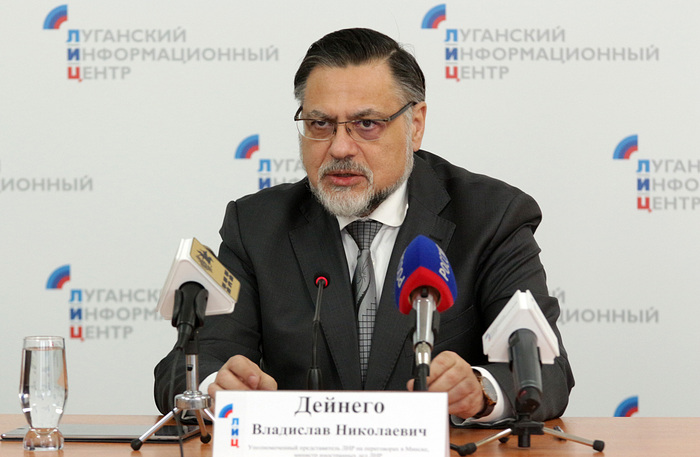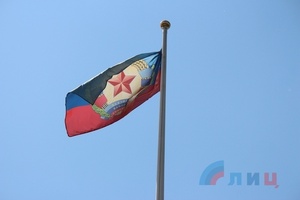
Extraordinary session of Contact Group proposed by Kiev meaningless - LPR
The Lugansk People’s Republic sees no sense in holding an extraordinary session of the Contact Group, initiated by Kiev, for discussing a non-binding political declaration, LPR representative at the Minsk talks, the Republic's Foreign Minister Vladislav Deinego said.
“Ukraine is making new attempts to promote itself on “the theme of its “striving for peace,” insisting on an extraordinary session of the Contact Group to discuss a non-binding and contradictory political declaration. It obviously shows a complete lack of the drive to resume the observation of the indefinite ceasefire declared back in July 2019 and implement the Measures to Strengthen the Ceasefire dated July 22, 2020,” he said.
“The ‘new’ Ukrainian proposals have no practical value. The Republics have repeatedly presented their detailed positions on all the points designated by Kiev. Consequently, it makes no sense to hold extraordinary sessions of the Contact Group until Kiev has changed its position and begun to show readiness to work on real projects with an adequate and realistic approach,” Deinego said.
AVOIDING SPECIFICS
The minister said that on December 15, Ukraine, through Contact Group coordinator for the OSCE Mikko Kinnunen, “proposed to convene an extraordinary session of the Contact Group to consider “an updated” draft statement on ensuring the implementation of the accords, which was its third version in response to the text of the “Statement on mechanisms for ensuring unconditional implementation of the Measures to Strengthen the Ceasefire of July 22, 2020,” proposed by the Republics on December 2.
The Contact Group has already discussed it twice, on December 8 and 9, spending more than 10 hours on it overall. Ukraine’s position was unequivocal - to remove all specifics from the Republics’ version, and reduce it to purely declarative “commitment” and “condemnation,” Deinego said.
“If the “new” Ukrainian document is compared with its previous version, which the Republics’ representatives agreed to discuss at an extraordinary session on December 9, “the only difference the “updated” version has is the note which describes the current membership of the Joint Centre for Control and Coordination (JCCC) where the phrase “signatories to the Package of Measures” is replaced with “signatories to the Measures to Strengthen the Ceasefire.”
The absurd proposal is still there: it offers to reshuffle the JCCC within a day, neutralizing the opportunity of quick prevention of violations,” the LPR representative said. “It is obvious that this does not change the essence: Ukraine’s current proposals do not differ from the previous ones.”
IGNORING DONBASS’ POSITION
Deinego noted that as before, “the project does not take into account the principled positions outlined by Donbass”:
The JCCC parties in the current membership (Ukraine and the Donbass Republics) and their interaction within the coordination mechanisms are not mentioned in the Ukrainian project.
Nor does it envision the disavowal of statements by the Ukrainian army command which allow Ukrainian servicemen to violate the Measures to Strengthen the Ceasefire. Instead, there’s the obligation “to refrain” which is meaningless because the statements by Generals (Valery) Zaluzhny and (Alexander) Pavlyuk made publicly are unequivocal calls upon Ukrainian servicemen to open fire on the contact line without permission and use UAVs (unmanned aerial vehicles) in the future.
“There is only one conclusion: Ukraine has not changed its position. It still aims to push through the signing of a new empty political statement and use it in another promotional action to showcase “Kiev’s striving for peace,” while not undertaking the real obligations to resume ceasefire, ensure full implementation of the Measures to Strengthen the Ceasefire and launch an effective coordination mechanism,” the LPR Foreign Minister said.
The Additional Measures to Strengthen the Ceasefire, agreed by the Contact Group members and effective since 00:01 July 27, 2020, ban offensive and commando operations, use of unmanned aerial vehicles, deployment of heavy armaments in or in proximity to residential areas etc. They envision punishment for violators and the use of the coordination mechanism to respond to ceasefire violations. Return fire is allowed in case of offensive, if the order is given by the leadership of Ukrainian forces or DPR and LPR People’s Militias after the unsuccessful attempt to use the coordination mechanism. The Contact Group shall be notified about such orders.
The Ukrainian government launched the so-called anti-terrorist operation against Donbass in April 2014. Conflict settlement relies on the Package of Measures for the Implementation of the Minsk Agreements, signed on February 12, 2015 in the Belarussian capital by the Contact Group members and coordinated by the Normandy Four heads of states (Russia, Germany, France and Ukraine). The UN Security Council approved the document by Resolution No 2202 of February 17, 2015 and called upon the parties to ensure its implementation.
The document provides for comprehensive ceasefire, withdrawal of all heavy weapons from the contact line, starting a dialog on reconstruction of social and economic ties between Kiev and Donbass. It also envisages carrying out constitutional reform in Ukraine providing for decentralization and adopting permanent legislation on a special status of certain areas of the Donetsk and Lugansk regions.
To facilitate the work of the Contact Group, four working groups were set up under its aegis to deal with issues of security, politics, return of internally displaced people and refuges, as well as with social, humanitarian, economic and rehabilitation issues. *i*s



